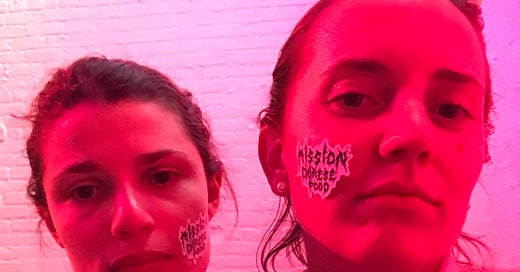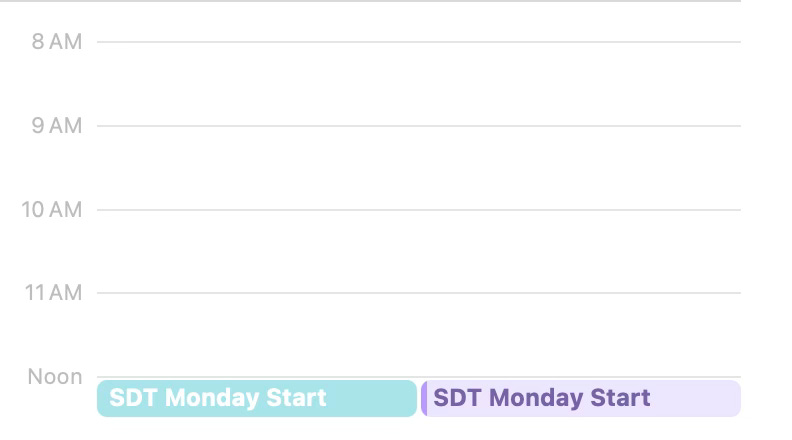The world feels like it's in a state of contraction right now—and the sticky mix of fear and uncertainty is driving businesses to lean into the perverse comforts of scarcity.
We’ve been here before. Much of the current economic landscape reminds us of those first few months of 2020. And we’ve learned so much from that time, we really can’t face going back.
So, we’re sharing a reflection of a moment when we were feeling a similarly precarious scarcity squeeze—and how we turned away from that moment and came out all the stronger.
~~
Alex: When I launched Daly in 2019—and hired Ally as my first, key hire—we decided that we weren’t going to let our size get in the way of our ambitions to get Daly’s name on the map as an agency that was forging a new path within the PR space (and leaving the old ways of doing things firmly in the past).
Within our first year, we were working with the likes of Penguin Random House and Tinder as a team of only five (!!), had built out a gorgeous Soho office, were hiring left and right, traveling across the globe (Zurich, London, San Francisco, LA, Montréal!) for client and journalist meetings, and generally leaning into the abundance that runaway success was affording us.
Then everything came to a halt in March 2020, as it did for many others across nearly every industry, but especially in media & PR, where airtight contracts were quickly deemed superfluous, and unceremoniously slashed from shrinking budgets. By the last week of March, phone calls from our new client base came streaming in like clockwork, to either terminate their contracts entirely or slash retainers by 50% or more.
My first inclination was towards one of retraction and scarcity. I remember calling our business coach, the great Holly Howard, in tears. How would I tell the team that we might not go on? She followed up with an email afterwards; the subject line read “Resilience.”
So the next day, I changed my tune. I resumed work with a war room, fight or flight mentality; we pitched ourselves for every scrappy, underpaid project imaginable—even ones that didn’t align with our mission-driven commitments. We worked with temperamental founders, and learned new skills on the fly. We did it all. As a result of this work, our team of five made it to the end of the year with full pay and benefits intact. This was a cause for celebration—or so we initially thought.
What we didn’t realize was: while our war-like mentality had been successful in reaching its goal of keeping our team and company afloat, it was ultimately led by an underlying fear-driven mindset. We were all working ourselves to the bone—and while the team kept their jobs and got paid, which was undoubtedly important, it wasn’t enough. The year had taken a toll on the whole team—Ally and I included—and because of immense burnout, team members began dropping like flies within weeks of each other, taking on new jobs, leaving without a job at all.
We did what we had to do to get through the year. But when we started 2021 essentially back where we started in 2019—as a core team of two, with a project list fully stripped down—I vowed to never go back to that place of fear and scarcity again. To gain the momentum we needed to build Daly back up from scratch, we needed to take the idea of buoyancy to a new level, rejecting scarcity and embracing a culture of true abundance.
This is where the fun—and growth—really began.
~~
Ally: While “abundance” isn’t technically one of Daly’s four core values, it’s certainly become one of our guiding principles over the last four years. And when you think about it, abundance actually touches each of those four values we do have—intimacy, transparency, urgency, and pivoting—in different ways.
Holding that concept in our minds, we set out to rebuild Daly in 2021 with the guiding principle: How does leading with abundance look, in practice—in both good and precarious times alike?
At Daly this looks like:
Finding ways to increase tangible benefits to the team without increasing incurred costs, in periods when Daly had lower revenue, and thus a lower return of profit share to the team. In the past, such extension of benefits has included:
The addition of quarterly flex PTO days on top of our existing, already-expansive PTO policy;
Increasing Daly’s “work from any time zone” benefit to offer more flexibility beyond just a single week per year, and empowering the employees taking advantage of the benefit to create a schedule that worked for their clients, their team, and themselves;
Introducing Slow Down Time (Daly’s proprietary approach to the 4-day work week) as a way to create additional space for employees’ personal lives and goals throughout the work week, to support their whole selves both at and outside of work.
Sending personally-relevant, thoughtful gifts (gift cards for dinner on Daly, a mani/pedi, a cake, or a bottle of wine) to reward a team member for a job well done, or to show a little extra love and support during a hard time;
Turning down prospective clients that don’t align with Daly’s values, even during periods when we could really use the extra revenue boost. We even created a New Business Evaluation Tracker that evaluates our new business conversations along value-aligned metrics like a brand's DEI and social impact commitments, intimacy match with our team, topic alignment with Daly’s expertise and focus, and more.
What works for your company will likely look different from what works for Daly. Your company’s model of abundance will need to be adapted for your size, company stage, and specific culture and values—but doesn’t necessarily need to be limited by your financial situation. That’s the point! Living in a mindset of abundance is very much tied to your own company’s lived culture, and what you (and your team) cares about most, and needs most, at any given time.
Cultivating this gut sense of what your team and your business really need takes time—leading with abundance is a muscle that needs to be trained. It can start with an open conversation with your employees, and an open introspective conversation with yourself (or your fellow leadership team, depending on the structure of your company and your role within it).
Ask yourself questions like—what practices are we already doing that reflect our company’s commitment to abundance? Where are areas in which we’re acting out fear, anticipation, or scarcity, and how can we take small, reasonable steps to flip our mental switch towards making decisions that assume an abundant future?
Progress is a process—with this, and with everything in corporate life. We’re constantly stopping ourselves mid-decision to evaluate whether we’re letting fear drive a decision, and if so, how we can pause to reflect on a new path.













Fantastic! Thank you for sharing.
This was such a perfect morning read and a beautiful peek at a how taking care of YOU perpetuates the opportunity to take better care of your WORK!